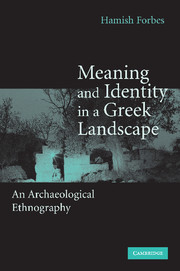Book contents
- Frontmatter
- Contents
- List of Illustrations and Tables
- Preface and Acknowledgements
- Transliteration Conventions
- 1 Introduction
- 2 Landscape Studies: From Frame-and-Tame to Visceral Feeling
- 3 Historical Background to the Landscape of Methana
- 4 Conducting Fieldwork on Methana
- 5 Kinship, Marriage and the Transmission of Names and Property
- 6 The Productive Landscape
- 7 The Historical Landscape: Memory, Monumentality and Time-Depth
- 8 The Kinship Landscape
- 9 The Religious Landscape
- 10 Conclusions: A Greek Landscape from Within
- Glossary
- Notes
- References
- Index
8 - The Kinship Landscape
Published online by Cambridge University Press: 04 May 2010
- Frontmatter
- Contents
- List of Illustrations and Tables
- Preface and Acknowledgements
- Transliteration Conventions
- 1 Introduction
- 2 Landscape Studies: From Frame-and-Tame to Visceral Feeling
- 3 Historical Background to the Landscape of Methana
- 4 Conducting Fieldwork on Methana
- 5 Kinship, Marriage and the Transmission of Names and Property
- 6 The Productive Landscape
- 7 The Historical Landscape: Memory, Monumentality and Time-Depth
- 8 The Kinship Landscape
- 9 The Religious Landscape
- 10 Conclusions: A Greek Landscape from Within
- Glossary
- Notes
- References
- Index
Summary
Τά ᾽χουμ᾽ άπ᾽ τους παππούδες μας (we have them from our grandfathers).
(Methana saying)INTRODUCTION
The idea of a landscape representing a kinship system is ancient. To many ancient Greeks, their total life experience, including the visible and invisible worlds, was structured in a reality based on supernatural beings, all related to each other in a complex web of descent and marriage. In The Theogony (the Origin of the Gods), the Archaic Greek poet Hesiod described the world's creation in terms of the genealogy of the gods. Thus, Night was born of Erebos, the supernatural personification of the realms under the earth. From Night, in turn, were born Air and Day. The Sky, Mountains, and Sea are all described as children of Earth, herself a sibling of Erebos. At a local level, a particular spring, known to Hesiod as the Horse's Fountain, was created by the flying horse Pegasus, who sprang from the neck of Medusa (the Gorgon) when Perseus, himself a descendent of Herakles, cut off her head.
My intention in this chapter is not to show that Methanites' views of their landscape mirrored those of the ancient Greeks nor to argue that there is an unbroken cultural link between the Greeks of the first millennium b.c. and Methana's present. The ‘kinship landscape’ described by Hesiod is fundamentally different from the ‘kinship landscape’ to be described here.
- Type
- Chapter
- Information
- Meaning and Identity in a Greek LandscapeAn Archaeological Ethnography, pp. 286 - 342Publisher: Cambridge University PressPrint publication year: 2007



